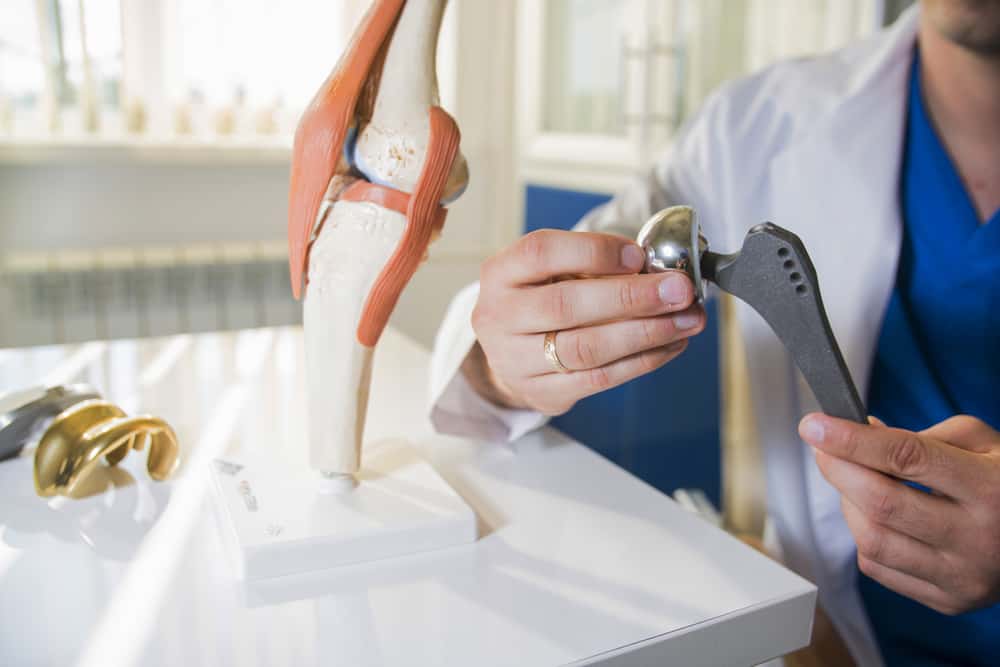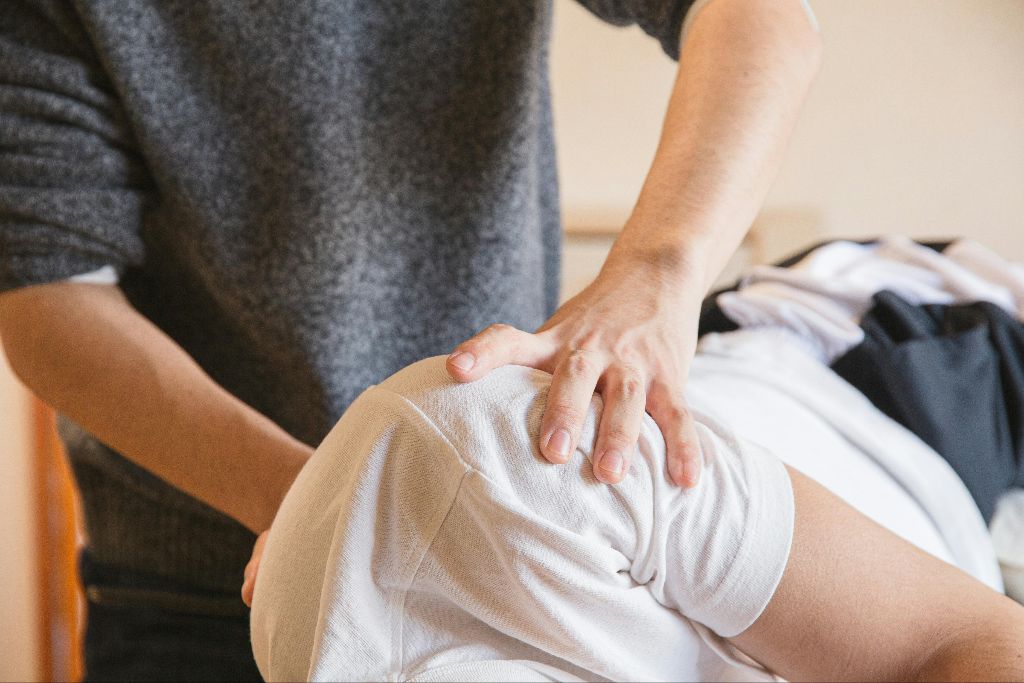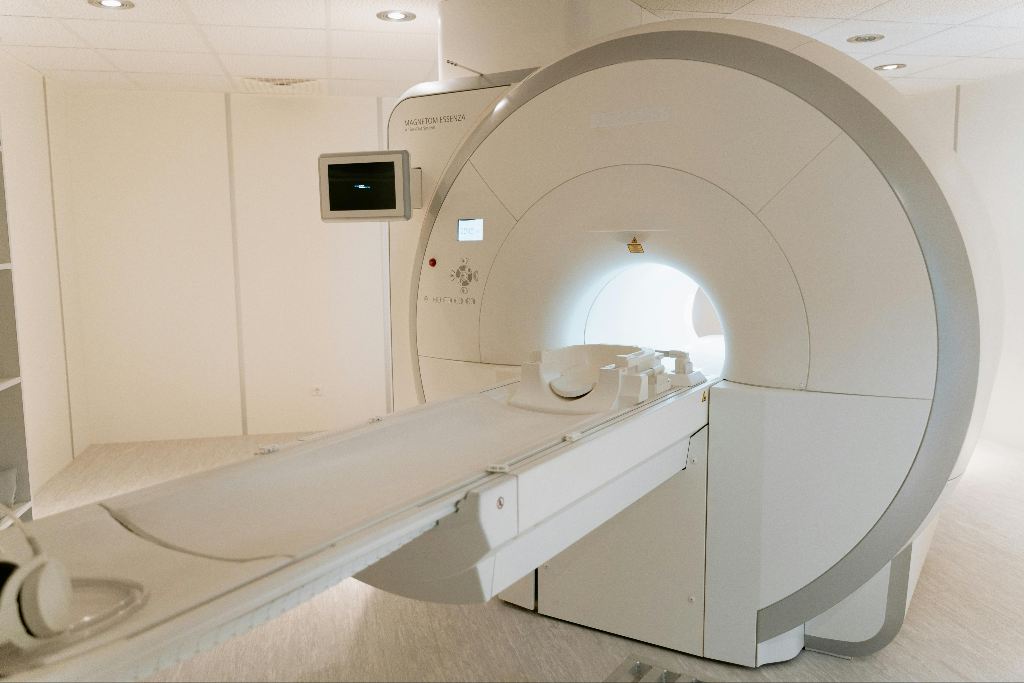A total joint replacement is a procedure in which parts of an arthritic joint are removed and replaced. This replacement joint is designed to replicate the movement of a healthy, normal joint. Joint replacement procedures can help relieve pain and enable patients to live a fuller, more active life. Hip and knee replacement surgeries are one of the most common orthopedic procedures performed in the United States today. Once you and your doctor have determined that a joint replacement is right for you, you will need time to prepare both emotionally and physically to ensure a smooth surgery and recovery period.
If you have arthritis and are experiencing any joint pain, we welcome you to reach out to AICA to ensure that you receive any additional care that you may need as well as an effective treatment plan for your joints.
What Is a Total Joint Replacement?
A total joint replacement is a procedure in which the damaged joint is replaced with an implant that mimics the motion of your natural joint. The implant is made from a combination of plastic, metal, and ceramic components. The procedure involved the removal of worn cartilage from both sides of the joint being replaced, followed by resurfacing the joint with the implant that functions similar to your original joint. Although almost every joint can be replaced, the majority of total joint replacements are done in the hip or knee.
The pros of a total joint replacement include a reduction in pain and improvements in mobility, daily functioning, and overall quality of life. Improvements in surgical techniques and implant materials have made total joint replacements one of the most durable and reliable procedures in the medical field. In many cases, with a new joint, patients experience much less pain and may even be pain-free. Depending on a patient’s age, they may be able to use the joint normally and move it with a full range of motion, the same way they could with their normal joint.
How Do I Prevent the Need for a Total Joint Replacement?
The need for a total joint replacement can be minimized by medical treatment of your arthritis. Medications, nutritional supplements, exercise modifications, weight loss, and joint injections can help patients live with arthritis for as long as possible.
When these treatments are no longer excessive and you’re experiencing pain along with a decrease in function, a total joint replacement can relieve the pain and ultimately restore the quality of life. In some cases of younger patients with arthritis, joint preserving procedures including osteotomies, debridement, and cartilage transplantation may be helpful in delaying a total joint replacement surgery.
Am I a Good Candidate for a Total Joint Replacement?
The best candidates for a total joint replacement are typically patients with severe joint pain who have not had success with non-surgical treatments. An improvement in implant durability has led to more total joint replacements in younger people than before, so there is no set age limit for the procedure. The decision is typically made based on your medical condition and fitness for surgery as well as how much arthritis is affecting your overall quality of life.
Typically patients know it’s time to consider a total joint replacement surgery when they can no longer physically do the things they enjoyed before, when medications they take no longer ease the pain reasonably well, when they cannot sleep through the night without waking up due to pain, or when they can no longer easily do daily activities such as getting out of a chair, using a toilet, and going up or down stairs.
Most patients who undergo a total joint replacement procedure are sufficiently healthy in order to allow the surgery to be performed safely. Ultimately the decision is made by the patient with the help of a specialist after a thorough examination. During the examination, x-rays may be used to diagnose the need for a total joint replacement procedure. Between the x-ray images and the examination, the doctor will determine the cause of your joint pain.
How Do I Prepare for a Total Joint Replacement Procedure?
It’s important to give yourself time to prepare for all aspects of a total joint replacement. Planning ahead for any potential challenges and recovery will help to ensure a successful outcome. It’s also important to ensure that each provider involved in your care has the necessary information to make the best decisions for your specific case. Your main job is to follow any instructions that you’re given by your healthcare team in order to prepare for your surgery.
Learn About Your Procedure
It is important that you discuss what to expect before, during, and after your procedure with your healthcare provider. You may want to ask your doctor what the process is for being admitted to the hospital, what type of anesthesia you will receive, what type of implant will be used in your procedure, how long you’ll be in the hospital, and how long your recovery will take. It’s also important to speak up if you have concerns or if you do not understand some aspect of your procedure.
Assemble Your Medical Information
It will help to make sure you have your insurance information and medical history readily available since many people will be asking questions regarding these items. Gathering this information will help to ensure that your healthcare team has all of the critical information they need to perform a successful surgery. It is helpful to have a list that includes any medical conditions you have, previous surgeries you have undergone, medications you take, allergies you have to drugs or anesthesia, and dietary restrictions you have.
Get in Shape for Your Procedure
Getting into the best possible physical shape prior to your surgery can help to shorten recovery time and reduce the chance of complications related to the procedure. Cutting down on smoking, reducing alcohol intake, eating a nutritious diet, and performing specific exercises can all be helpful ways to get in shape. It’s important that you discuss any preparation with your specialist to determine the best path for your specific needs.
What Is Life Like after a Total Joint Replacement Procedure?
Typically after recovery from a total joint replacement, patients are able to return to a high level of activity. The duration of recovery following the procedure will depend on your general health, overall physical fitness, degree of impairment before surgery, the type of surgery you have, and level of activity prior to surgery. Occupational and physical therapy after the procedure is also extremely important.
Physical limitations after a total joint replacement are normally due to other orthopedic or rheumatologic issues or major health problems. In most cases, patients that undergo the procedure are able to return to unlimited low-impact activity, including walking, biking, swimming, and golf. Many doctors may advise against high-impact activity that includes heavy lifting, jumping, and running.
Post-Procedure Exercise Program
It will be important to keep up with the exercise program after your procedure that your doctor and physical therapist provide. The doctor can provide you with a joint replacement, but it’s up to you to take care of it and exercise it. Your exercise program may include regular long-distance walking to make you more mobile and help you gradually resume other activities such as climbing stairs, standing, and getting up and down from a chair. It’s also important to engage in regular exercise designed to strengthen the muscles around your new joint. Your healthcare team can help to determine the best exercises for your specific needs.
Post-Procedure Risks
Although people typically obtain a functional range of motion following a total joint replacement, sometimes the limits of motion of a joint replacement can be exceeded, resulting in dislocation. A patient’s understanding of any limitations following the procedure can reduce the chances of injury and complication. It’s important to talk to your specialist about any specific limitations, precautions, and restrictions you may need to take following your surgery.
Your specialist will walk you through any potential risks or complications of the procedure, including those related to the surgery itself and those that can occur over time after your surgery. Most of these complications, including infection, blood clots, nerve injury, and prosthesis problems, can be treated successfully. In some instances, artificial joints will wear out, which may require a joint revision procedure. It is important that you discuss any concerns you have with your specialist.
Get Treated Today
Visit AICA Orthopedics to learn more about how our team of doctors can help you receive a proper diagnosis and provide you with an effective treatment plan for your joint injury. Our specialists will talk you through all of your options for your injury, and our orthopedic doctors will help you determine what treatment will work best for you. We also have physical therapists who work alongside our orthopedic surgeons and other specialists to ensure that you receive quality, comprehensive care as you recover. Call or visit us online to get started at an AICA Orthopedics location near you.





